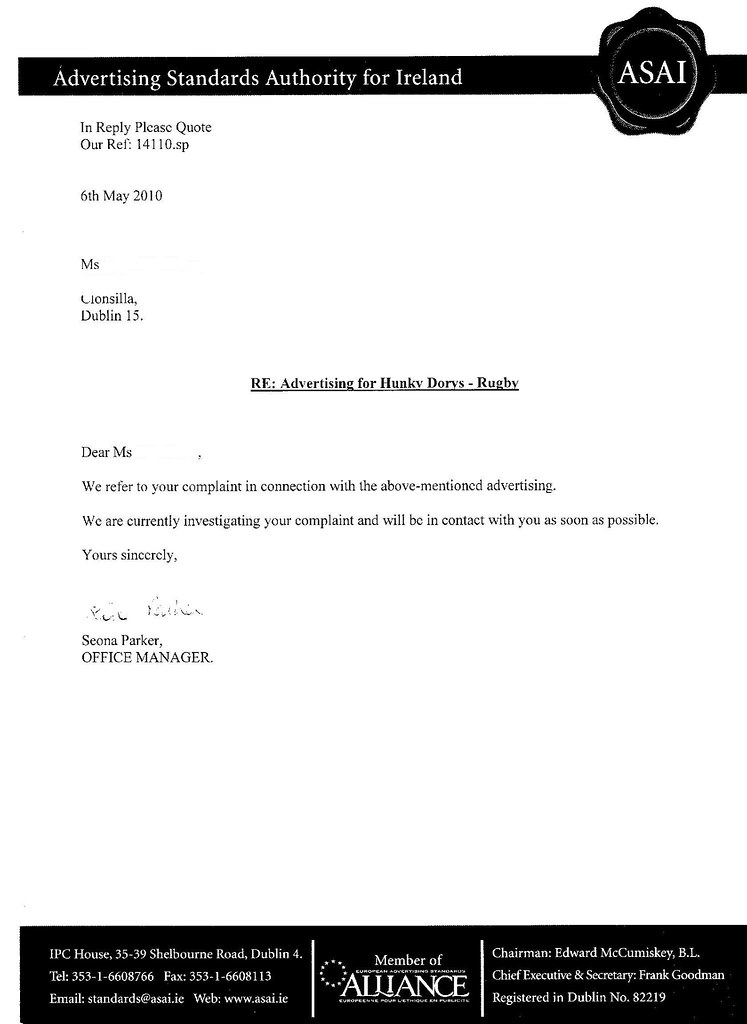Category Archives: Uncategorized
So the new Aviva stadium is finally finished…
I’ve heard a lot about it, from how it’s so green and the work which has gone into it as a family member works there. I am glad it’s done and the fact it’s opening date was drawing near explains why there have been ads for croker the last while. I really look forward to going there and contrasting it with the old place but really, why does it look like a bedpan?

Things I never wanted or expected to see…
Reply from the ASAI re Largo Foods ads.
I was disappointed when I saw the latest ads from Largo foods. They produce all Irish crisps in the country and I had been a fan of the product the ads were used for from when they first appeared on the Irish market over 10 years ago. There was no other crisps for me.
This then filtered into the household as I do the weekly shop and what crisps my kids eat.
They both like the buffalo flavored ones and found those adds to be funny.
The controversial ads pissed me off, as here was a brand I trusted, was regularly seen in the house was never one I had to worry about image wise re the kids and my own personal values getting it wrong, very wrong.
So wrong in fact that when I out with my kids when the ads were put up they both expressed discomfort at seeing them and wanted to know why such sexy images were used as they made no sense and they were right they made no sense what so ever in the selling of snack foods. The kids asked is there something we can do, as I have tried to bring them up to do something when they see something they think is wrong.
We got home and wrote emails to Largo Foods expressing our disappointment and to their pr firm to which we have had no reply and we lodged a complaint via the ASAI website.
We got a letter today from the Advertising Standards Authority For Ireland.

The kids were pleased to see that at least we got one reply, I look forward to seeing if the investigation bears out or will the ads be pulled by Largo Foods before they are instructed to remove them. We are still how ever boycotting those crisps and will be unless there’s a statement from Largo Foods which doesn’t sound like some smug git saying lighten up their just boobs.
May the 4th
Horrorscope Sunday, 25 April 2010
http://www.astro.com
Some obstacle ***
Valid during many months: During this time sudden, unexpected events will test your ability to withstand change and to stay on the path you have chosen. Each of us sets forth certain objectives that we must accomplish in order to successfully maintain our sense of being a unique and strong individual. This influence seems to ask the question, “Do you really believe in what you are doing? Can you perform your tasks in the face of upsets and challenges from the outside world and even from psychological forces within yourself?” How well you withstand this challenge will determine how well your life will go during the next several years.
On one hand you may suddenly realize that because of circumstances that have developed over the last several years you can no longer do what you want without making a lot of changes. It may be necessary to struggle and break free from circumstances that you encounter in your work or with authorities, such as employers or government agencies. There may even be limiting circumstances in your personal life, such as a bad love relationship or parental domination. At any rate some obstacle is preventing you from doing what you have to do, and you want to rebel against it.
On the other hand, you may be doing perfectly well in all of these matters. Your job may be perfectly satisfactory, and your personal life may be fulfilling, a real expression of who you are. But something comes along, some unexpected incident that forces you to reevaluate what you are doing. For example, at work someone may throw you a “curve ball,” such as an employer suddenly questioning your effectiveness in work or a similar disruption. You may have to reevaluate your relationships to the various groups you belong to.
If you are doing what you should in terms of your life and experience, these disruptive events will only be a test that you will withstand successfully. But if you find the energies of this period destructive beyond your control, you should consider what changes must be made either to minimize these effects or to turn them into positive ones.
The interpretation above is for your transit selected for today:
Uranus Square Sun, , exact at 03:03
activity period from beginning of April 2010 until beginning of March 2011
TED Blog: The sobering realities of post-volcano travel: Peter Greenberg at TEDxVolcano
“The Dark Side of Birth Control:” 50 years of the contraceptive pill.
Found this article yesterday, it is nice for this to be spoken about.
I think too many drs just hand out the pill and expect women to read and understand the leaflet with it (which has tiny print and is in medical gobbledygook) with out explaining how hormonal contraception works or what the side effects might be.
Seem it takes women talking to other women to find out what the side effects are and so that we think we are not going mad.
The Dark Side of Birth Control: The Pill Still Has Many Adverse Affects Glossed Over By Big Pharma
On the 50th anniversary of the pill, we need to appreciate this remarkable innovation while also being honest about its limitations.
March 17, 2010 |As we get ready, in 2010, to celebrate the 50th anniversary of hormonal contraception in the United States, women have every right to stand up and cheer for a birth control option that has revolutionized how effective a contraceptive can be. “The Pill” and its descendants have indeed provided women with a unique tool that has changed the terms in which women control their social and professional choices.
Amidst all the applause, though, let us not oversimplify the history of a drug that has often coupled danger with opportunity, and indeed reinforced some serious inequities even as it promised to enhance women’s rights. Today, 50 years later, ovulation suppression through hormonal drugs still harbors many adverse effects, which range from mood swings and diminished libido, to fatalities from blood clots. The innovation itself emerged at the cost of experimentation on poor women, and came, in part, out of a desire to control the fertility of poor populations.
The pill was able to be born because of deep social and economic injustices, not solely as a response to them. The pill trials were conducted on poor women in Puerto Rico, in part because they had fewer legal protections against some of the dangers of new drug trials. Male doctors scoffed when female doctor Edris Rice-Wray suggested that the side effects of the new pill might be too numerous to be generally tolerable and carried on with hardly a pause when more than one woman in the trial died mysteriously. It turned out that Rice-Wray was right about the risks of the pill but wrong about women’s willingness to endure them.
It might be easy to see the approval acceptance of hormonal contraception as a pure female victory, and indeed it happened in part because women deeply hungered for reliable birth control. It is also true that it was moved forward not only to satisfy this need, but because of deep anxieties among the powerful that a booming population in the developing world would lead to the spread of communism, and that a similar growth in poor (and non-white) populations within the United States would cause domestic instability. Even as the pill offered the promise of liberation to affluent women it provided a powerful and easily abused tool for controlling the fertility of poor and disempowered women. Margaret Sanger realized this, and readily voiced deeply racist and classist sentiments in service of her otherwise valiant agenda.
Within just a few years of the approval of Enovid, the first pill, it became clear that women were experiencing serious adverse health effects. Barbara Seaman, a young journalist for Brides and Ladies Home Journal magazines realized how common truly frightening health problems were when she began receiving letters from readers. Experiences ranged from the aggravating —weight gain, mood swings, sexual problems—to the life threatening—blood clots and other potentially fatal problems including cancers. Seaman’s ground-breaking 1969 book, The Doctors’ Case Against the Pill, chronicled the suffering of real women on the pill and documented the multiple health risks tying the silence and lack of information about them to drug company greed, unequal power between doctors and patients, and sexism in American life.
It was a tough message for many women to hear, and certainly one that defied (and continues to defy) a narrative that argues simply that access to reliable birth control gives women power. But for those who were willing to take up the difficult implications of Seaman’s work, an important feminist model emerged. When members of DC Women’s Liberation disrupted hearings on the pill spearheaded by Senator Gaylord Nelson it was to protest the manipulative way the pill was being marketed to women, not to praise the product. Women were demanding something truly radical: the right to insist not just on access to contraception, but to demand that the products be safe. Today, while many valid questions about the pill’s safety and side effects remain, the hormone dose has been reduced ten times, and patient package inserts have been added to warn patients of the risks. This is due to the tireless efforts of the women’s health movement.
Women have certainly seen their lives and opportunities transformed in the past fifty years. While the pill is one powerful player in this remarkable story, this revolution has occurred largely through the persistent efforts of women (in multiple contexts and conditions) on their own behalves. The pill did not create second wave feminism. And likewise, it did not create all the changes that that remarkable movement oversaw. Those things happened because courageous women were willing to sacrifice and fight over time for them. In recent years, the reproductive justice movement, powerfully led in many cases by feminists of color, has made the point that single-mindedly striving for the right to birth control and abortion ignores the complex power systems that too often dictate the terms in which women make decisions about their health in general and their reproductive and sexual health in particular.
Laura Eldridge is a women’s health writer and activist. Her upcoming book In Our Control: The Complete Guide to Contraceptive Choices for Women (Seven Stories Press; June 2010) will be the most comprehensive book on birth control since the 1970s.
Via @pluincee on twitter
You shall go to the gig!
I don’t get to many gigs, between the cost of some of them these days and the brats more often then not I find myself in the position of wishing I could go and it just not happening.
When I heard that the Evelyn Evelyn gig was happening, I decided I was going, it was far enough out that I could make arrangements, so the tickets were booked. Then there was a fecking natural disaster!
Boyfriend stranded in Holland, the band and crew for Evelyn Evelyn stranded also and due to having to work late
my sitter had to cancel, but Amanda Palmer made it and is doing a solo gig. My co parent has offered to take a half day from work and as it turns out there will be a fair few people I know still going to the gig and I have even manged to arrange a lift in.
Note to self: Be your own fairy godmother more often, you’re worth it.
